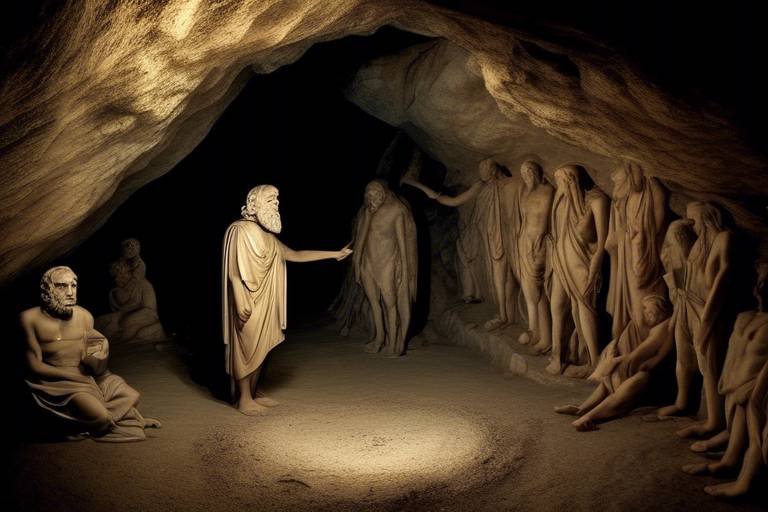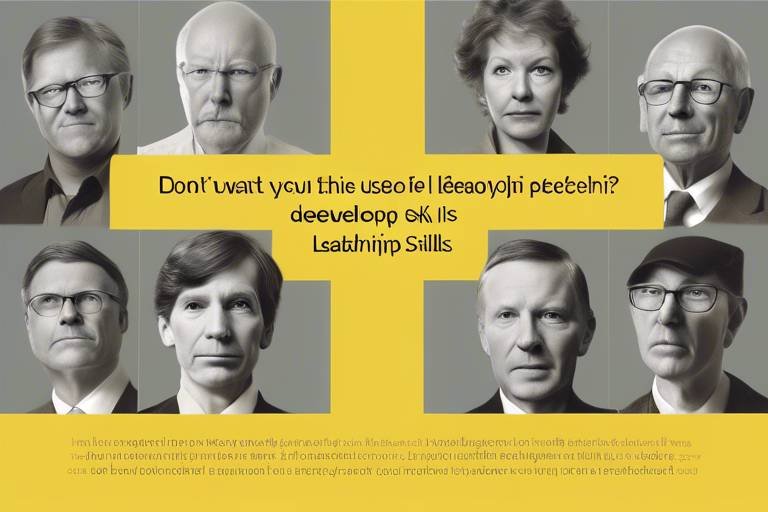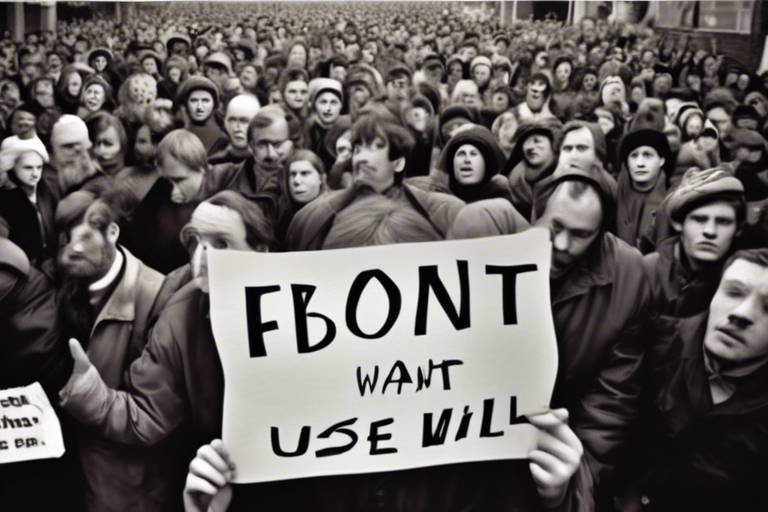Revisiting Plato's Allegory of the Cave
Have you ever felt like you were living in a bubble, only seeing a fraction of the world around you? Plato's Allegory of the Cave is a profound philosophical metaphor that dives deep into the essence of reality and perception. Imagine being chained in a dark cave, unable to see anything but shadows flickering on the wall in front of you. These shadows represent the limited understanding most of us have about the world. This allegory isn't just a relic of ancient philosophy; it resonates with our modern lives, urging us to question the very nature of our reality. In a society flooded with information, it challenges us to discern what is real and what is merely a reflection of our own misconceptions.
As we peel back the layers of this allegory, we uncover themes that are incredibly relevant today. The cave symbolizes a world where ignorance reigns, and the journey out of the cave signifies the pursuit of knowledge and enlightenment. This journey is not just a personal quest; it has profound implications for our society as a whole. The shadows on the wall, akin to the media narratives we consume, can distort our understanding of reality. Thus, revisiting Plato's allegory invites us to reflect on our own lives and consider how we can escape our metaphorical caves.
In this exploration, we will examine the nature of reality, the concept of enlightenment, and the importance of perspective. We will also discuss how these themes play out in our contemporary world, where misinformation and superficial understanding often cloud our judgment. By engaging with Plato's ideas, we can better navigate the complexities of modern existence and strive toward a more enlightened society.
At the heart of Plato's Allegory of the Cave lies a fundamental question: What is reality? The allegory encourages us to ponder the difference between the shadows we see and the objects casting those shadows. In our own lives, this prompts us to ask ourselves: Are we merely accepting the information presented to us, or are we actively seeking the truth behind it? Plato suggests that most people live in a state of ignorance, mistaking shadows for reality. This notion is particularly relevant in today's world, where social media and sensationalized news can distort our perceptions.
To illustrate this further, consider a table comparing perception and reality:
| Perception | Reality |
|---|---|
| What we see and believe | What actually exists |
| Influenced by emotions and biases | Objective and factual |
| Can be manipulated by external forces | Independent of our beliefs |
This table highlights the disparity between our perceptions and the underlying reality. Recognizing this gap is the first step toward enlightenment—a principle that we will explore in more detail in the following sections.
Enlightenment, in the context of Plato's allegory, is the journey from ignorance to knowledge. It's about breaking free from the chains that bind us to our limited understanding. Just as the prisoner in the cave must struggle to turn around and eventually escape into the light, we too must confront our fears and biases to gain a clearer view of the world. This process of awakening is not always comfortable; it requires us to challenge long-held beliefs and embrace the discomfort of uncertainty.
Breaking free from the shadows of ignorance is akin to shedding a heavy coat that no longer serves us. It's a transformative experience that can be both exhilarating and frightening. When we confront our misconceptions, we often find that our previous understanding of the world was just a shadow play. The first step in this journey is acknowledging that we may not have all the answers and that our perceptions can be flawed. This realization opens the door to deeper understanding and growth.
Education is a powerful tool in the quest for enlightenment. It acts as the light that illuminates our path, helping us to see beyond the shadows. Through education, we gain the knowledge and skills necessary to navigate the complexities of life. It empowers us to question the status quo and seek out the truth. In today's world, where misinformation is rampant, a solid education can be the difference between remaining in the cave or stepping into the light.
However, the journey toward enlightenment is fraught with challenges. Individuals often face societal resistance when they challenge prevailing beliefs. Fear of ostracism or ridicule can prevent many from seeking the truth. Additionally, the comfort of ignorance can be alluring; it’s easier to accept what we know than to confront the unknown. Yet, those who dare to venture beyond the cave often find that the rewards of enlightenment far outweigh the risks.
The themes of Plato's Allegory of the Cave are strikingly relevant in today's society. With the rise of social media and the prevalence of misinformation, many find themselves trapped in a cycle of consuming shadows rather than seeking authentic knowledge. The allegory serves as a reminder of the importance of critical thinking and discernment in our information-saturated world. It's essential to question the narratives we encounter and to seek out diverse perspectives to gain a fuller understanding of reality.
Understanding different perspectives is crucial in grasping the allegory's message. Our individual experiences shape how we interpret reality, and recognizing this can enrich our understanding. By engaging with various viewpoints, we can challenge our assumptions and expand our horizons. This is not just an intellectual exercise; it’s a vital skill that enhances our critical thinking and decision-making abilities.
The tension between perception and reality is a central theme in the allegory. Our interpretations of events and experiences shape our understanding of the world, often leading us to act based on incomplete or distorted information. By acknowledging this tension, we can strive to bridge the gap between what we perceive and what is truly real. This awareness fosters a more nuanced understanding of complex issues.
Finally, fostering critical thinking skills is paramount in empowering individuals to question assumptions and seek deeper truths. In a world where information is abundant but often misleading, the ability to think critically is invaluable. It enables us to sift through the noise and identify what is truly important. By cultivating these skills, we can encourage a culture of inquiry and understanding, ultimately leading to a more enlightened society.
- What is Plato's Allegory of the Cave about?
It is a philosophical metaphor that illustrates the difference between the world of appearances and the world of reality, emphasizing the importance of enlightenment.
- How does the allegory relate to modern society?
It highlights the challenges of misinformation and the need for critical thinking in a world saturated with information.
- What role does education play in achieving enlightenment?
Education serves as a crucial tool that illuminates the path toward understanding and truth.

The Nature of Reality
The nature of reality is a profound topic that has captivated philosophers, scientists, and thinkers for centuries. In Plato's Allegory of the Cave, we are introduced to a world where prisoners are chained in a dark cave, only able to see shadows cast on the wall by objects behind them. This powerful metaphor raises critical questions about what we consider to be real. Are the shadows we see the entirety of existence, or are they mere illusions, mere reflections of a deeper truth?
To grasp the essence of reality, we must first acknowledge that our perceptions are often clouded by our experiences, beliefs, and societal influences. Just like the prisoners in the cave, many of us are confined to our own limited perspectives. We might ask ourselves: How much of what we see is shaped by our surroundings? How often do we accept things at face value without questioning their authenticity? The allegory serves as a wake-up call, urging us to challenge our assumptions and seek a greater understanding of the world around us.
In modern society, this exploration of reality is more relevant than ever. With the rise of technology and social media, we are bombarded with information that can distort our perceptions. For instance, consider the following:
| Source of Information | Potential Impact on Reality Perception |
|---|---|
| Social Media | Creates echo chambers, reinforcing existing beliefs. |
| News Outlets | Can present biased narratives, shaping public opinion. |
| Personal Experiences | Color our understanding, often leading to subjective truths. |
This table illustrates how various sources can manipulate our understanding of reality. Just as the prisoners in the cave were limited to shadows, we too can become trapped in our own perceptions, unable to see the full picture. The challenge lies in breaking free from these constraints and seeking out the truth that exists beyond our immediate experiences.
Ultimately, the nature of reality is not a straightforward concept. It is a complex interplay of perception, belief, and knowledge. By engaging with the questions posed by Plato's allegory, we can embark on a journey of discovery, striving to uncover the layers of truth that lie beneath the surface. This quest for understanding not only enriches our individual lives but also enhances our collective consciousness, fostering a society that values critical thinking and open-mindedness.

The Concept of Enlightenment
Enlightenment is a concept that resonates deeply within Plato's Allegory of the Cave, serving as a metaphorical journey from darkness into light. It represents not just the acquisition of knowledge, but a profound transformation of one's entire being. Imagine being chained in a dark cave, only able to see shadows flickering on the wall. These shadows, though familiar, are mere illusions of reality. The moment you break free and step into the sunlight, it's as if a veil has been lifted, revealing a world bursting with color, depth, and clarity. This transition is what enlightenment embodies—a shift from ignorance to understanding.
In our modern society, the quest for enlightenment is just as vital. We are surrounded by information, yet much of it is cloaked in confusion and misinformation. The journey towards enlightenment is not simply about accumulating facts; it's about developing a critical perspective that allows us to discern truth from falsehood. This process can be both exhilarating and daunting, as it challenges our preconceived notions and compels us to confront uncomfortable realities.
To illustrate this concept further, let’s consider a few key elements that define the journey towards enlightenment:
- Awareness: Recognizing that there is more to reality than what we perceive is the first step. It’s about questioning the status quo and being open to new ideas.
- Curiosity: A genuine desire to learn and explore beyond the surface. This involves asking questions and seeking answers, much like a child discovering the world for the first time.
- Reflection: Taking the time to reflect on our beliefs and experiences. This introspection is crucial in understanding how our perceptions shape our reality.
Each of these elements plays a significant role in the journey towards enlightenment. However, it’s essential to recognize that this journey is often fraught with challenges. Many individuals face societal pressures that discourage questioning and critical thinking. This resistance can manifest in various forms—be it through the influence of media, peer pressure, or cultural norms. Overcoming these obstacles requires not only courage but also a commitment to personal growth.
Moreover, education is a powerful catalyst for enlightenment. It serves as the light that illuminates the dark corners of ignorance. When individuals engage in lifelong learning, they equip themselves with the tools necessary to navigate the complexities of life. Education fosters a sense of empowerment, enabling people to challenge existing paradigms and contribute positively to society. In this context, enlightenment is not just a personal journey; it becomes a collective endeavor that can lead to societal transformation.
Ultimately, the concept of enlightenment is about embracing a mindset that values knowledge, understanding, and growth. It encourages us to step out of our comfort zones, confront our biases, and seek deeper truths. As we embark on this journey, we not only enrich our own lives but also inspire others to do the same. The path to enlightenment may be challenging, but it is undeniably rewarding, leading us towards a more authentic existence.
Q: What is the significance of enlightenment in Plato's Allegory of the Cave?
A: Enlightenment signifies the journey from ignorance to knowledge, representing a deeper understanding of reality beyond mere shadows.
Q: How can individuals pursue enlightenment in their daily lives?
A: Individuals can pursue enlightenment by fostering curiosity, engaging in critical thinking, and embracing lifelong learning.
Q: What challenges do people face when seeking enlightenment?
A: Common challenges include societal resistance, personal fears, and the overwhelming amount of misinformation in today’s world.

Breaking Free from Illusions
In Plato's Allegory of the Cave, the journey from darkness to light symbolizes a profound transformation that each of us must undergo to break free from the chains of ignorance. Imagine living in a dimly lit cave, where the only reality you know is the flickering shadows cast on the wall in front of you. These shadows represent the limited perceptions and beliefs that shape your understanding of the world. The first step in breaking free from these illusions is recognizing that what we perceive may not be the complete truth. This realization can be both exhilarating and terrifying, much like stepping into the sunlight after a long period of darkness.
To embark on this journey, one must confront the uncomfortable truths about their own beliefs and the sources of their information. It requires a willingness to question everything, including the very foundations of our understanding. Are we merely passive observers of our reality, or are we active participants in shaping it? This critical self-reflection is essential for breaking the chains that bind us to our misconceptions.
Consider the following steps that can help facilitate this process:
- Awareness: Acknowledge that you may be living in a bubble of limited perspectives. This awareness is the first step toward enlightenment.
- Curiosity: Cultivate a sense of curiosity about the world around you. Ask questions, seek out new experiences, and be open to learning.
- Dialogue: Engage in conversations with others who have different viewpoints. This exchange of ideas can challenge your preconceived notions and broaden your understanding.
- Critical Thinking: Develop your critical thinking skills. Analyze information, weigh evidence, and consider the validity of your beliefs.
Breaking free from illusions is not a one-time event; it’s a continuous journey. Just as the prisoners in the cave initially resist the light, we too may face challenges in accepting new truths. Fear of the unknown can be paralyzing, but it is essential to embrace discomfort as a part of growth. This process can feel like peeling away layers of an onion—each layer reveals more of the truth, but it can also bring tears. However, the clarity gained from confronting these layers is invaluable.
Moreover, the role of community cannot be understated. Surrounding ourselves with individuals who encourage growth and exploration can significantly enhance our journey. Sharing insights and experiences fosters an environment where breaking free from illusions becomes a collective endeavor. In this supportive space, we can challenge each other, share revelations, and celebrate breakthroughs.
Ultimately, breaking free from illusions is about reclaiming our agency in a world filled with distractions and misinformation. It’s about realizing that we have the power to shape our understanding of reality, rather than allowing external forces to dictate it. As we navigate this complex landscape, let us remember that enlightenment is not a destination but a lifelong pursuit. The more we strive to uncover the truths hidden beneath the shadows, the more we illuminate our path and the paths of those around us.
Q: What does it mean to break free from illusions?
A: Breaking free from illusions involves recognizing and challenging the misconceptions and limited beliefs we hold about ourselves and the world around us. It requires a commitment to seeking deeper truths and understanding.
Q: How can I start my journey toward enlightenment?
A: Begin by cultivating awareness of your beliefs, fostering curiosity about different perspectives, engaging in meaningful dialogue, and developing critical thinking skills. Each step will help you move closer to enlightenment.
Q: Why is community important in this journey?
A: Community provides support, encouragement, and diverse perspectives, which can enhance your understanding and help you confront your illusions more effectively.

The Role of Education
Education is like a beacon of light in the dark cave of ignorance, illuminating the path toward understanding and truth. It’s not just about memorizing facts or passing exams; it’s about cultivating a mindset that encourages curiosity and critical thinking. In Plato's Allegory of the Cave, the journey from darkness to light symbolizes the transformative power of education, urging us to question our surroundings and seek deeper truths. Imagine being trapped in a cave, staring at shadows on the wall, believing them to be the entirety of existence. Education is the key that unlocks the cave door, allowing us to step out and experience the vibrant world beyond.
But what does this journey entail? The role of education extends beyond traditional classrooms; it encompasses all forms of learning, whether through formal education, life experiences, or self-directed study. Here are some crucial aspects of education that contribute to enlightenment:
- Critical Thinking: Education fosters analytical skills, enabling individuals to evaluate information critically rather than accepting it at face value. This skill is essential in navigating today's complex world filled with misinformation.
- Awareness of Perspectives: Through education, we learn to appreciate diverse viewpoints. This awareness broadens our understanding and helps us recognize that our perception of reality is just one of many.
- Empowerment: Knowledge empowers individuals to make informed decisions and challenge societal norms. An educated individual is more likely to question the status quo and seek meaningful change.
Moreover, education should not be a passive experience. It’s about engaging with ideas, debating concepts, and applying knowledge to real-world situations. Think of it as a toolkit that equips you to dismantle the shadows in your life. The more tools you have, the better prepared you are to build a brighter future.
However, the journey of education is not without its challenges. Many individuals face barriers such as access to quality education, societal expectations, and personal fears that can hinder their quest for knowledge. It’s crucial to recognize these obstacles and work collectively to create environments that promote learning and enlightenment. Just as the freed prisoner in the allegory faced resistance from those still in the cave, individuals pursuing education may encounter skepticism or hostility from those who prefer the comfort of ignorance.
In conclusion, the role of education in the journey toward enlightenment cannot be overstated. It serves as a powerful catalyst for personal and societal growth, helping individuals break free from the chains of ignorance and embrace the light of knowledge. As we reflect on our own educational journeys, let us remember that learning is a lifelong endeavor, one that continuously shapes our understanding of reality and enriches our lives.

Challenges of Enlightenment
Embarking on the journey toward enlightenment is akin to climbing a steep mountain; the view from the top is breathtaking, but the ascent can be fraught with obstacles. One of the most significant challenges individuals face is the societal resistance to new ideas. When someone begins to question long-held beliefs or challenges the status quo, they may encounter skepticism or outright hostility from those around them. This reaction can be discouraging and may lead individuals to retreat back into the comforting shadows of ignorance rather than embrace the light of knowledge.
Moreover, personal fears can act as formidable barriers on the path to enlightenment. The fear of the unknown can paralyze even the most curious minds. Imagine standing at the edge of a cliff, contemplating a leap into the unknown; the thrill of discovery is enticing, but the fear of falling can hold you back. Many people grapple with this internal conflict, where the desire for growth is overshadowed by the anxiety of what lies ahead. This struggle can manifest in various forms, such as procrastination or self-doubt, which ultimately impede progress.
Additionally, the overwhelming amount of information available today can complicate the pursuit of enlightenment. We live in an age where knowledge is at our fingertips, yet the sheer volume can be daunting. It’s like trying to find a needle in a haystack; how do you discern what is valuable and true from the noise? This challenge is exacerbated by the prevalence of misinformation, which can distort reality and lead individuals astray. To combat this, one must develop a discerning eye and critical thinking skills, akin to sharpening a tool before using it. Only then can one navigate the complexities of modern information and uncover genuine insights.
In light of these challenges, it is crucial to cultivate a supportive environment that encourages exploration and questioning. Whether through educational institutions, community groups, or online forums, having a network of like-minded individuals can provide the encouragement needed to persevere. By sharing experiences and insights, individuals can bolster each other's resolve and create a collective momentum toward enlightenment. Remember, the journey is often more rewarding when shared with others, as they can offer guidance and perspective that enrich the experience.
- What is enlightenment in the context of Plato's Allegory of the Cave?
Enlightenment refers to the process of gaining knowledge and understanding, moving from ignorance (the shadows) to a clearer perception of reality (the outside world). - Why is societal resistance a challenge to enlightenment?
Societal resistance can manifest as skepticism or hostility towards new ideas, making it difficult for individuals to embrace change and seek deeper truths. - How can I overcome personal fears on the path to enlightenment?
Recognizing and confronting these fears, seeking support from others, and gradually exposing oneself to new ideas can help mitigate these challenges. - What role does misinformation play in hindering enlightenment?
Misinformation can create confusion and lead individuals to false conclusions, making it essential to develop critical thinking skills to navigate the vast amount of information available.

Implications for Modern Society
As we navigate the complexities of modern life, the themes presented in Plato's Allegory of the Cave resonate more than ever. Today, we find ourselves in a world saturated with information, yet much of it is cloaked in shadows, much like the prisoners in the cave. The allegory serves as a poignant reminder that what we perceive through our screens and media may not always reflect reality. In fact, many of us live in a state of cognitive dissonance, where our beliefs are shaped by curated narratives rather than objective truths.
Consider the impact of social media and news outlets that often prioritize sensationalism over factual reporting. Just as the prisoners in the cave mistook shadows for reality, we too can become prisoners of our own perceptions, influenced by what is presented to us rather than seeking out the light of truth. The implications are profound: misinformation spreads like wildfire, and the quest for authentic knowledge becomes increasingly challenging. In this context, the allegory encourages us to question the narratives we encounter daily and to seek a deeper understanding.
Moreover, the journey towards enlightenment depicted in the allegory underscores the importance of critical thinking in our society. In a world where opinions often overshadow facts, developing the ability to analyze information critically is essential. This means not only questioning the sources of our information but also being open to diverse perspectives. After all, just as the freed prisoner in the allegory had to adjust to the blinding light outside the cave, we must be willing to confront uncomfortable truths that challenge our preconceived notions.
To illustrate the current landscape, consider the following table that highlights key factors influencing our perception of reality:
| Factor | Impact on Perception |
|---|---|
| Social Media Algorithms | Can create echo chambers, reinforcing existing beliefs. |
| Misinformation | Leads to confusion and distrust in credible sources. |
| Education | Empowers individuals to discern fact from fiction. |
| Critical Thinking | Encourages questioning and deeper understanding of issues. |
In essence, the allegory serves as a call to action for modern society. It challenges us to break free from the chains of ignorance and to step into the light of knowledge. By doing so, we not only enrich our own understanding but also contribute to a more informed and enlightened community. Embracing this journey requires courage and a willingness to confront the shadows that cloud our perception. Are we ready to step outside the cave and seek the truth, even when it feels uncomfortable?
- What is Plato's Allegory of the Cave?
It is a philosophical metaphor that illustrates the difference between the world of appearances and the world of reality, emphasizing the journey from ignorance to enlightenment. - How does the allegory relate to modern society?
The allegory highlights the dangers of misinformation and the importance of critical thinking in navigating today's complex information landscape. - What role does education play in this context?
Education is crucial in helping individuals discern truth from falsehood and fostering a culture of critical inquiry. - How can we encourage critical thinking in ourselves and others?
By questioning assumptions, seeking diverse perspectives, and engaging in open discussions about various topics.

The Importance of Perspective
When we dive into the depths of Plato's Allegory of the Cave, one of the most striking revelations is the significance of perspective. Imagine being trapped in a dimly lit cave, only able to see the shadows of objects projected on the wall in front of you. This scenario serves as a powerful metaphor for how our understanding of reality can be limited by our perspectives. Just as the prisoners in the cave are unaware of the world outside, many of us may find ourselves constrained by our own viewpoints. So, how do we break free from these limitations? Understanding different perspectives is crucial in this journey.
In our daily lives, we often encounter situations where our beliefs and interpretations are shaped by our experiences, culture, and environment. This can lead to a narrow view of reality, where we might dismiss ideas that challenge our preconceptions. However, embracing diverse perspectives can enrich our understanding and foster empathy. For instance, consider how people from different backgrounds might interpret the same event in vastly different ways. By engaging with these varied viewpoints, we can gain a more comprehensive understanding of the world around us.
Moreover, perspective plays a vital role in critical thinking. When we challenge our own views and consider alternative ideas, we open ourselves up to new possibilities and insights. This process can be likened to adjusting the lens of a camera; when we shift our focus, we can capture a clearer and more vibrant image of reality. Encouraging ourselves and others to explore different perspectives not only enhances our critical thinking skills but also promotes a culture of open dialogue and understanding.
To illustrate the importance of perspective, let's take a look at a simple table that summarizes how different viewpoints can influence our understanding:
| Perspective | Influence on Understanding |
|---|---|
| Personal Experience | Shapes our beliefs and reactions based on what we have lived through. |
| Cultural Background | Offers a framework for interpreting events and behaviors, which can differ widely. |
| Educational Influence | Guides our approach to problem-solving and critical analysis. |
| Media Consumption | Affects our perceptions of reality, often shaping our opinions without us even realizing it. |
In conclusion, the importance of perspective cannot be overstated. By embracing a variety of viewpoints, we not only enrich our understanding of reality but also cultivate a more empathetic and informed society. So, the next time you find yourself in a discussion, consider stepping into someone else's shoes. You might be surprised by the insights you gain!
- Why is perspective important in understanding reality? Perspective shapes our beliefs and interpretations, allowing us to see the world in a more nuanced way.
- How can I develop a better perspective? Engaging with diverse viewpoints, reading widely, and having open conversations can help broaden your perspective.
- What role does education play in shaping perspective? Education exposes us to different ideas and critical thinking skills, which are essential for understanding multiple perspectives.

Perception vs. Reality
When we dive into the depths of , we uncover a fascinating dichotomy that shapes our understanding of the world. Imagine standing in front of a beautiful painting; your interpretation of it may be vastly different from that of someone else. This subjective experience is a perfect illustration of how our perceptions can distort or enhance the reality of a situation. In Plato's Allegory of the Cave, the prisoners are confined to a dark space, only able to see shadows cast on a wall. For them, this shadowy world is their entire reality. But what happens when one of them breaks free and steps into the light? Suddenly, everything they thought they knew is challenged. This powerful metaphor reminds us that our perceptions are often limited and can lead us to misunderstand the broader truths of existence.
In today's world, this conflict between perception and reality is more relevant than ever. With the rise of social media and instant information, what we perceive can be heavily influenced by external factors. Consider the following:
- Media Influence: News outlets and social media platforms often present information in a way that shapes our perceptions, sometimes prioritizing sensationalism over factual accuracy.
- Personal Biases: Our backgrounds, experiences, and beliefs can cloud our judgment, leading us to interpret reality in a way that aligns with our preconceived notions.
- Confirmation Bias: We tend to seek out information that confirms our existing beliefs, further entrenching our perceptions and distancing us from reality.
To illustrate this point, let's take a look at a simple table that compares perception and reality in various scenarios:
| Scenario | Perception | Reality |
|---|---|---|
| Social Media | Everyone is living a perfect life. | People often share only their highlights, not the struggles. |
| News Headlines | The world is a dangerous place. | Many regions are safe and thriving; the news often focuses on negative events. |
| Personal Relationships | My friends are always happy. | Everyone faces challenges and struggles, even if they don't show it. |
Understanding this distinction between perception and reality is crucial for personal growth and societal progress. It encourages us to question our assumptions and seek out deeper truths. By acknowledging that our perceptions can be flawed, we open ourselves up to new perspectives and richer experiences. This journey towards enlightenment requires a willingness to challenge our own views and consider the viewpoints of others, leading to a more nuanced understanding of the world around us.

Encouraging Critical Thinking
In a world brimming with information, the ability to think critically is more essential than ever. Just imagine being a detective, sifting through clues to uncover the truth. Critical thinking empowers individuals to become their own detectives, enabling them to analyze information, discern fact from fiction, and make informed decisions. But how do we cultivate this vital skill in ourselves and others? It starts with fostering an environment that encourages questioning and curiosity.
First and foremost, it's crucial to create a culture where asking questions is not just accepted but celebrated. Think about it: when was the last time you felt comfortable challenging a widely accepted notion? By encouraging open discussions and debates, we can provide a platform for diverse opinions and perspectives. This not only enhances our understanding but also allows us to see the multifaceted nature of reality, much like the shadows on the wall in Plato's cave.
Moreover, education plays a pivotal role in nurturing critical thinking. Traditional education often emphasizes rote memorization, which can stifle creativity and inquiry. Instead, we should advocate for teaching methods that promote analytical skills. For instance, project-based learning and Socratic questioning can ignite a passion for exploration. Imagine students not just learning about history but actively debating the motivations behind historical events. This approach transforms passive learners into active participants in their education.
Another effective method to encourage critical thinking is through the use of real-world scenarios. By presenting individuals with complex problems that require thoughtful solutions, we can sharpen their analytical skills. Consider a table of various scenarios that challenge common assumptions:
| Scenario | Common Assumption | Critical Question |
|---|---|---|
| Climate Change | It's not a serious issue. | What evidence supports or contradicts this belief? |
| Social Media Influence | All information shared is factual. | How can we verify the credibility of sources? |
| Economic Policies | Higher taxes always hurt the economy. | What are the potential benefits of increased taxation? |
By analyzing these scenarios, individuals can practice evaluating assumptions and exploring alternative viewpoints. It’s like peeling an onion; each layer reveals a new perspective that enhances our understanding of the issue at hand.
Lastly, we must not overlook the role of technology in fostering critical thinking. In an age where information is just a click away, teaching digital literacy becomes crucial. Individuals should learn to navigate the vast ocean of online content critically. This includes recognizing biases, understanding the purpose behind various forms of media, and identifying misinformation. By developing these skills, we empower ourselves and others to engage with information more thoughtfully.
In conclusion, encouraging critical thinking is not merely an academic exercise; it is a life skill that enriches our understanding of the world. By creating an environment that values inquiry, embracing innovative educational practices, analyzing real-world scenarios, and leveraging technology, we can cultivate a generation of critical thinkers. So, are you ready to embark on this journey of discovery and enlightenment? Your quest for truth starts now!
- What is critical thinking? Critical thinking is the ability to analyze information objectively and make reasoned judgments.
- Why is critical thinking important? It helps individuals make informed decisions, solve problems effectively, and understand complex issues.
- How can I improve my critical thinking skills? Engage in discussions, question assumptions, analyze different viewpoints, and practice problem-solving in real-life scenarios.
Frequently Asked Questions
- What is Plato's Allegory of the Cave about?
Plato's Allegory of the Cave is a philosophical metaphor that illustrates the difference between the world of appearances and the world of reality. It depicts prisoners who have been chained inside a dark cave, only able to see shadows on the wall, which represent their limited perception of reality. The allegory challenges us to question what we perceive as real and encourages exploration beyond our immediate experiences.
- How does the allegory relate to modern society?
The themes in Plato's Allegory resonate strongly in today's world, particularly regarding media influence and the prevalence of misinformation. Just as the prisoners in the cave are limited by their perceptions, individuals today may find themselves misled by distorted information, prompting a need for critical thinking and authentic knowledge.
- What does enlightenment mean in the context of the allegory?
Enlightenment, in the context of the allegory, refers to the journey from ignorance to knowledge. It symbolizes the process of breaking free from the shadows of misunderstanding and embracing a deeper understanding of reality. This journey is essential for personal growth and societal progress, as it encourages individuals to seek truth and challenge their preconceived notions.
- What role does education play in achieving enlightenment?
Education is pivotal in the journey toward enlightenment, as it serves as the key to unlocking the chains of ignorance. Through learning, individuals can gain insights that allow them to see beyond the shadows, fostering critical thinking and a clearer understanding of the world around them. It empowers people to question their beliefs and pursue deeper truths.
- What challenges do individuals face when seeking enlightenment?
Individuals often encounter various challenges on their path to enlightenment, including societal resistance, personal fears, and the comfort of familiar beliefs. These obstacles can hinder the pursuit of knowledge and understanding, making it essential for individuals to confront their misconceptions and remain open to new ideas.
- How can we encourage critical thinking in ourselves and others?
Encouraging critical thinking involves fostering an environment where questioning assumptions is welcomed. Engaging in discussions, exploring diverse perspectives, and challenging established norms can help individuals develop their critical thinking skills. By promoting curiosity and openness, we can empower ourselves and others to seek deeper truths and enhance our understanding of reality.
- Why is understanding different perspectives important?
Understanding different perspectives enriches our comprehension of reality and enhances critical thinking. It allows us to see beyond our own experiences and biases, fostering empathy and a broader view of the world. By appreciating diverse viewpoints, we can challenge our assumptions and gain a more nuanced understanding of complex issues.



















